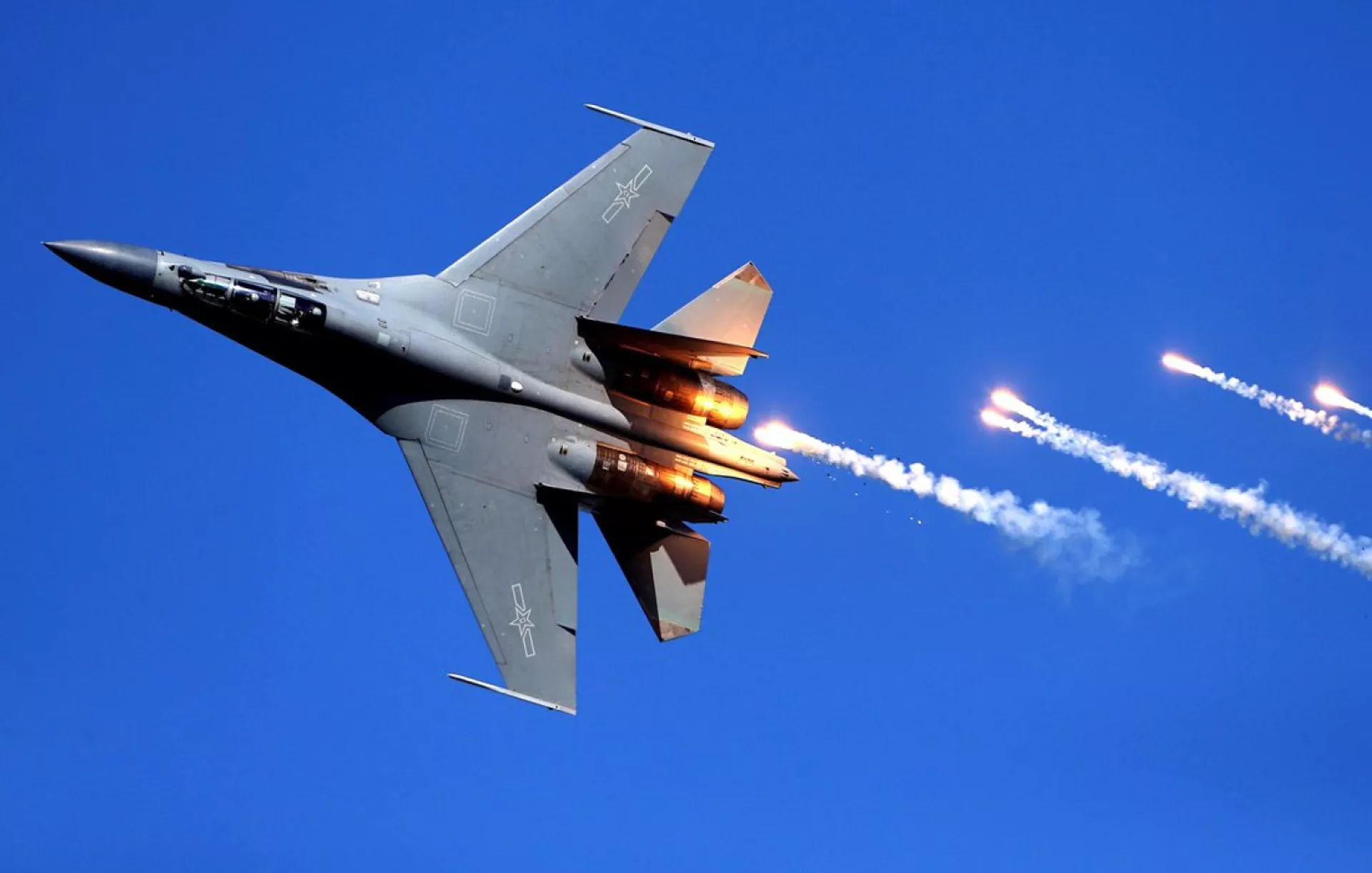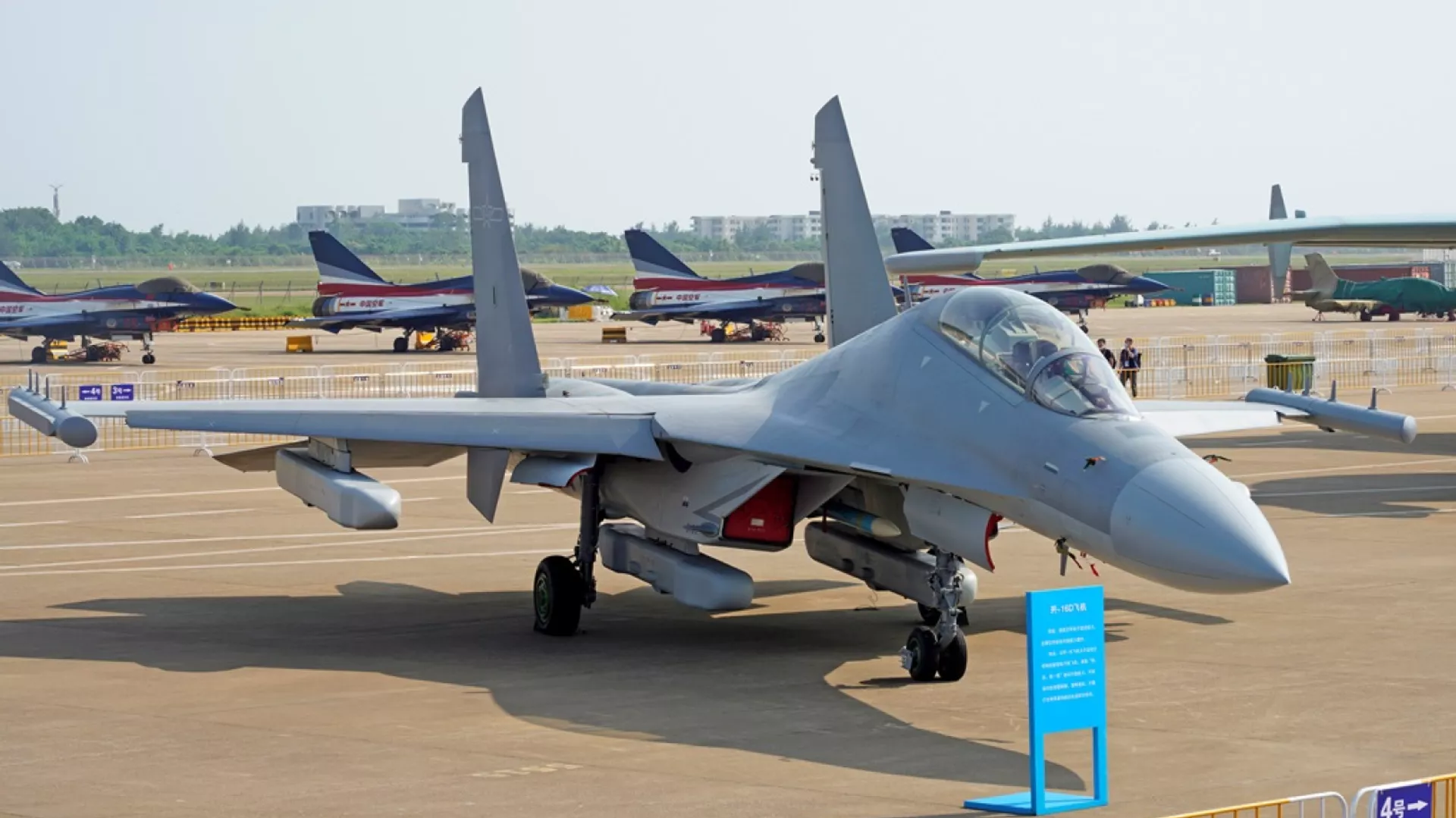https://sputnikglobe.com/20220125/taiwan-reports-first-sighting-of-two-chinese-j-16d-electronic-warfare-aircraft-near-island-1092514294.html
Taiwan Reports First Sighting of Two Chinese J-16D Electronic Warfare Aircraft Near Island
Taiwan Reports First Sighting of Two Chinese J-16D Electronic Warfare Aircraft Near Island
Sputnik International
Taiwan’s de facto defense ministry said on Monday it had detected two advanced Chinese electronic warfare jets flying near the island for the first time. The... 25.01.2022, Sputnik International
2022-01-25T19:18+0000
2022-01-25T19:18+0000
2023-06-19T12:43+0000
electronic warfare
j-16 fighter jet
electronic jammer
plaaf
taiwan
https://cdn1.img.sputnikglobe.com/img/07e6/01/19/1092513837_0:44:1625:958_1920x0_80_0_0_406e79219492466c3f95b20669b8d2f7.png.webp
Taiwan’s Ministry of National Defense reported tracking 13 Chinese People’s Liberation Army Air Force (PLAAF) aircraft flying through its Air Defense Identification Zone (ADIZ) on Monday: eight were J-16 multirole strike aircraft, one was a Y-8 anti-submarine warfare plane, two were H-6 strategic bombers, and two were J-16D electronic warfare aircraft.The J-16D, a version of Shenyang’s J-16 which only debuted in 2015, had never previously been spotted near the autonomous island, according to Taiwan Central News Agency. The jet carries four different electronic warfare pods designed to suppress enemy air defenses (SEAD) and disrupt communications systems across the EM band, and can also fire anti-radiation missiles, which home in on enemy radar sites.In all, the J-16D is a broad equivalent to the US Navy’s E-18 Growler, itself a heavily modified version of the F/A-18E/F Hornet fighter jet. Russia never developed a separate SEAD role for its strike aircraft, instead using “escort jammers” made out of modified bombers teamed up with either regular bombers or strike aircraft armed with anti-radiation missiles.Taiwan scrambled fighters in response to detecting the PLAAF aircraft, which were flying outside Taiwanese airspace but within its ADIZ, a self-declared and defined area where it claims the right to identify aircraft flying through it, military and civilian alike. In the Western media, such flights have been characterized as violations of Taiwanese airspace and a bellicose prelude to a Chinese attack. While the Chinese government sees Taiwan as a rebellious province destined to be reunited with the rest of China, it doesn’t have the means at present to invade the island.Taiwan, once the ruling government of all of China, has been autonomous from Beijing since the victorious communist forces founded the People’s Republic of China in 1949. The island’s government has survived largely with US backing, even as Washington switched its recognition of the legitimate Chinese government from Taipei to Beijing in the 1970s, keeping open an informal lifeline that has included the sale of advanced weapons systems like F-16V “Viper” fighter jets.According to the Taiwanese MND, the aircraft on Monday flew between Taiwan and Pratas, an island in the northern South China Sea that’s controlled by the government in Taiwan. Further to the south, two US Navy aircraft carrier battle groups led by the carriers USS Carl Vinson and USS Abraham Lincoln began operations on Sunday after performing joint exercises east of Taiwan in conjunction with Japanese self-defense forces.Last week, the PLA Navy said it had warned off another US warship, the destroyer USS Benfold, which strayed too close to the Paracel Islands, one of several island chains in the South China Sea that China claims as its territory. However, Vietnam also claims to own the islands.The US says it operates in the region to deter Chinese aggression and defend the region’s smaller nations, but Beijing has its own dialogue with the Association of Southeast Asian Nations (ASEAN) on developing a mutual code of conduct for the waterway and established hotlines to settle their disputes.
taiwan
Sputnik International
feedback@sputniknews.com
+74956456601
MIA „Rossiya Segodnya“
2022
News
en_EN
Sputnik International
feedback@sputniknews.com
+74956456601
MIA „Rossiya Segodnya“
Sputnik International
feedback@sputniknews.com
+74956456601
MIA „Rossiya Segodnya“
electronic warfare, j-16 fighter jet, electronic jammer, plaaf, taiwan
electronic warfare, j-16 fighter jet, electronic jammer, plaaf, taiwan
Taiwan Reports First Sighting of Two Chinese J-16D Electronic Warfare Aircraft Near Island
19:18 GMT 25.01.2022 (Updated: 12:43 GMT 19.06.2023) Taiwan’s de facto defense ministry said on Monday it had detected two advanced Chinese electronic warfare jets flying near the island for the first time. The fighters can jam enemy communications and radar systems, blinding air defenses to an incoming attack.
Taiwan’s Ministry of National Defense
reported tracking 13 Chinese People’s Liberation Army Air Force (PLAAF) aircraft flying through its Air Defense Identification Zone (ADIZ) on Monday: eight were J-16 multirole strike aircraft, one was a Y-8 anti-submarine warfare plane, two were H-6 strategic bombers, and two were J-16D electronic warfare aircraft.
The J-16D, a version of
Shenyang’s J-16 which only debuted in 2015, had never previously been spotted near the autonomous island, according to Taiwan
Central News Agency. The jet carries four different
electronic warfare pods designed to suppress enemy air defenses (SEAD) and disrupt communications systems across the EM band, and can also fire
anti-radiation missiles, which home in on enemy radar sites.
“It can take the lead in warfare with electromagnetic suppression … Then the assault group follows in its path to attack the enemy,” Fu Qianshao, a retired PLAAF equipment expert in Beijing, told the
South China Morning Post about the J-16D.
In all, the J-16D is a broad equivalent to the US Navy’s E-18 Growler, itself a heavily modified version of the F/A-18E/F Hornet fighter jet. Russia never developed a separate SEAD role for its strike aircraft, instead using “escort jammers” made out of modified bombers teamed up with either regular bombers or strike aircraft armed with anti-radiation missiles.
Taiwan scrambled fighters in response to detecting the PLAAF aircraft, which were flying outside Taiwanese airspace but within its ADIZ, a self-declared and defined area where it claims the right to identify aircraft flying through it, military and civilian alike. In the Western media, such flights have been characterized as violations of Taiwanese airspace and a bellicose prelude to a Chinese attack. While the Chinese government sees Taiwan as a rebellious province destined to be reunited with the rest of China, it doesn’t have the means at present to invade the island.
Taiwan, once the ruling government of all of China, has been autonomous from Beijing since the victorious communist forces founded the People’s Republic of China in 1949. The island’s government has survived largely with US backing, even as Washington switched its recognition of the legitimate Chinese government from Taipei to Beijing in the 1970s, keeping open an informal lifeline that has included the sale of advanced weapons systems like
F-16V “Viper” fighter jets.
According to the Taiwanese MND, the aircraft on Monday flew between Taiwan and
Pratas, an island in the northern South China Sea that’s controlled by the government in Taiwan. Further to the south, two US Navy aircraft carrier battle groups led by the carriers USS Carl Vinson and USS Abraham Lincoln began operations on Sunday after performing joint exercises east of Taiwan in conjunction with Japanese self-defense forces.
During those operations, one of the Navy’s stealth F-35C Joint Strike Fighters
slammed into the deck of the Carl Vinson, causing the pilot to eject and injuring seven on board the warship. The Navy said it had sent
more than two dozen F-35s on the deployment.
Last week, the PLA Navy said it had
warned off another US warship, the destroyer USS Benfold, which strayed too close to the Paracel Islands, one of several island chains in the South China Sea that China claims as its territory. However, Vietnam also claims to own the islands.
The US says it
operates in the region to deter Chinese aggression and defend the region’s smaller nations, but
Beijing has its own dialogue with the Association of Southeast Asian Nations (ASEAN) on developing a mutual code of conduct for the waterway and established hotlines to settle their disputes.


